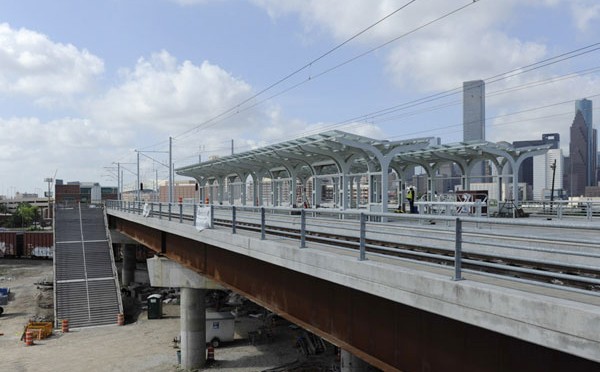Unless mine eyes and ears deceived me… yes. Though unlike the Chronicle’s Dug Begley, I’m not exactly ready to call him a ‘new rail line champion’.
In a bit of a shocker on the House floor yesterday, Congressman Ted Poe spoke in support of federal funding for Houston METRO’s University Line, the “cornerstone” branch of Houston’s light rail expansion that would connect Downtown and the Medical Center to the Galleria.
It’s common knowledge that John Culberson, who represents the area in which the westernmost branch of the rail line will run, is Capitol Hill’s most vocal opponent of rail transit. He has tried time and time again to kill all urban rail projects in Houston. But in speaking with Ted Poe yesterday on the House Floor, he almost sounded supportive of the line as well. Perhaps he was just trying to sound cordial with Poe and his Republican colleagues, but it’s a greater positive step than he’s ever taken before. From the video, Here’s what Poe had to say about the rail…
“…I have never been a strong champion of light rail, but my Congressional district includes a significant portion of the proposed rail line… A majority of my constituents in the affected area that would be served support the light rail. I am concerned that Section 166 of the bill that would prohibit federal funds from going to a part of the University Line that falls in… Mr. Culberson’s district, number 7. This language, although affecting his district primarily, indirectly affects my constituents because it has the effect of killing the whole project. Federal funds are needed to build the University Line in Houston. To be clear, Section 166 really doesn’t save any federal money, it just sends those funds to somewhere else…
I’ve recently surveyed the constituents who live in the affected area in my Congressional district… Those in the affected area want light rail. On Facebook alone over the last few days, 604 people supported light rail and 340 opposed it.”
Just in case you’ve forgotten, this rare occurrence where a member of Congress is against a project, but is later swayed by the overwhelming support of his constituents? That’s actually how our government is supposed to work. Americans send Congress to Washington so that they will vote the interests of their constituents, not just hold to their personal, rigid beliefs. It was also quite surprising to see Poe concede this fact publicly.
Now the next question… will Ted Poe’s reasoning be enough to sway John Culberson to drop his bill killing federal funding? No one knows for sure, but after yesterday’s events in Congress, Houston is again closer than ever to completing a major piece of it’s planned transit infrastructure. It’s good to see that some in Washington are beginning to figure out that Houston doesn’t need to fall behind just to prove a talking point.
Many Republicans in Culberson’s district are in support of transit investment. I asked Republican activist and Houstonian Christopher Busby what he thought of Poe’s remarks, and here was his response…
“As a former University of Houston student who understands the need for a modern transportation system, I think Congressman Poe’s support for the University line is great. As we continue to grow and become a more dense urban population, projects like the University light rail will become more and more essential to the development of our city’s infrastructure. We have reached the time when development of new roads and maintenance of old ones is not enough to sustain our population growth.”
But having more Houstonians in support of rail transit is just the first step. Most of the University Line is still planned as an At-Grade system, and that’s going to lead to more accidents in the future. While renewed hopes for federal funding are great, it’s time for city leaders and METRO to consider grade separation for the University Line. Most expect that when completed, this line will have the highest ridership of the whole system. It will also be traveling through the most high-density area of the city… an area that is still growing very rapidly. More people and more cars make for a higher probability of accidents. But if Houston plans for a better system now, those future issues can be avoided.
For more on this, check out Off the Kuff.







